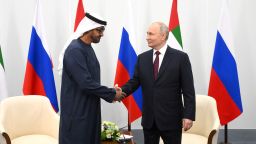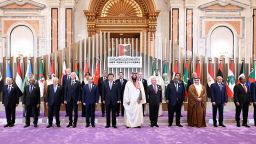Editor’s Note: A version of this story appears in CNN’s Meanwhile in the Middle East newsletter, a three-times-a-week look inside the region’s biggest stories. Sign up here.
More young Arabs see China as an ally of their countries than the United States, a survey of regional youth has found.
The US ranks seventh among nations considered as friendly, compared to China, which ranked second in the Arab Youth Survey conducted by Dubai-based public relations firm ASDA’A BCW.
The findings show that support for China has gradually risen over the years as Beijing expands its footprint in the region. But they also reveal that as much as Arabs want the US to play a smaller role in the Middle East, many believe the superpower will continue to be the most influential actor.
Eighty percent of respondents consider China to be an ally of their country, while 72% found the US to be one. Support for both countries has grown from last year, when the US stood at 63% and China at 78%.
By contrast, the 2018 edition of the survey found that other Arab nations dominated the top five countries seen as allies, with the exception of Russia, which ranked fourth. Neither China nor the US were among the top five. The 2015 survey ranked the US second.
This year’s survey, in its 15th edition, included face-to-face interviews with 3,600 Arabs aged 18 to 24 across 53 cities in 18 Arab countries, reflecting evolving sentiments prompted by a changing political landscape in the region.
Of those polled, 61% said they support US disengagement from the Middle East, with most support for this being recorded in North Africa and the Levant.
Arab states, particularly those in the Gulf, have been frustrated at what they see as the US’s waning interest in the region, and have in recent years begun charting their own foreign policy. They have refused to take sides in the Ukraine war and have grown closer to China, insisting that the world is moving towards multipolarity.
“The perception that the US is strategically pivoting away from the Middle East seems to be trickling down from governments to citizens in the region,” said Anna Jacobs, a senior Gulf analyst at the International Crisis Group think tank. “But this perception should be taken with a grain of salt. US soft power and its role as a security guarantor in the region is nowhere close to being replaced by other global powers like China or Russia.”
Young Arabs realize that, according to the survey. Despite the rise in China’s popularity, two-thirds still believe the US will be a “more important ally” than China and Russia over the next five years.
Charles Dunne, a former US diplomat who served in the Middle East, told CNN that as perceptions of the US’ moral and leadership roles in the regions may have diminished, he was “surprised the US ranked as high as it did.”
“Its recent diplomatic forays in the region, however, suggest China sees the US role there as being in relative decline, and is seeking opportunities to exert influence and build its own influence at American expense,” he said.
Venturing into diplomacy
Unlike the US, Beijing presents its agenda in the region with a focus on the economy and no strings attached. A 4,000-word joint statement between Saudi Arabia and China in December affirmed they would “defend the principle of non-interference in the internal affairs of states, rules of international law and basic principles of international relations.”
China has grown to be the largest trading partner of the region’s oil exporting states. Its trade with Saudi Arabia went from $4.1 billion in 2001 to $87.3 billion in 2021 – more than the US and the EU combined.
“The Middle East is already an arena of US-China competition, but regional actors have made it clear that they will not be cornered into choosing a side in great power competition,” said Jacobs. “They have too many interests in both the East and the West and feel they must maintain balanced relations with all the great powers.”
Traditionally an economic player in the region, Beijing has however begun venturing into Middle East diplomacy, long seen as an American domain.
China scored a diplomatic victory in March when it brokered a peace agreement between long-time rivals Iran and Saudi Arabia.
In April, China offered to mediate between Israel and the Palestinians. And just last week, it welcomed Palestinian Authority President Mahmoud Abbas with full military honors during his four-day state visit to China. Abbas is yet to visit the White House under the Biden presidency. Israeli Prime Minister Benjamin Netanyahu has also not yet been invited since returning to office in December.
“Biden has apparently abandoned the traditional US role as an honest broker,” said Dunne. “This retreat to a traditionalist Middle East policy… seems to me an acknowledgment that the president has enough problems – a hostile Congress, a tough re-election fight, the war in Ukraine, confrontation with China, and a domestic agenda that needs a lot of work – to take on a lot of new ones.”
The country whose reputation has suffered the most since last year’s survey is Russia, which fell to the rank of nine among nations Arab youth consider an ally, from third last year. It also ranks third among those countries Arabs consider an enemy this year, replacing the US which held that position last year, but now ranks fifth. Israel (86%) and Iran (57%) ranked highest as countries Arabs consider an enemy.
Russia’s involvement in conflicts across the Middle East may be responsible for the drop in its popularity, said Jacobs. “Their invasion of Ukraine seems to have exacerbated this.”
Post Disclaimer
Disclaimer: China surpasses US in popularity among Arab youth as Beijing expands Middle East footprint - Views expressed by writers in this section are their own and do not necessarily reflect Latheefarook.com point-of-view

